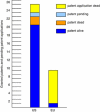Impact of gene patents on diagnostic testing: a new patent landscaping method applied to spinocerebellar ataxia
- PMID: 21811306
- PMCID: PMC3198141
- DOI: 10.1038/ejhg.2011.109
Impact of gene patents on diagnostic testing: a new patent landscaping method applied to spinocerebellar ataxia
Abstract
Recent reports in Europe and the United States raise concern about the potential negative impact of gene patents on the freedom to operate of diagnosticians and on the access of patients to genetic diagnostic services. Patents, historically seen as legal instruments to trigger innovation, could cause undesired side effects in the public health domain. Clear empirical evidence on the alleged hindering effect of gene patents is still scarce. We therefore developed a patent categorization method to determine which gene patents could indeed be problematic. The method is applied to patents relevant for genetic testing of spinocerebellar ataxia (SCA). The SCA test is probably the most widely used DNA test in (adult) neurology, as well as one of the most challenging due to the heterogeneity of the disease. Typically tested as a gene panel covering the five common SCA subtypes, we show that the patenting of SCA genes and testing methods and the associated licensing conditions could have far-reaching consequences on legitimate access to this gene panel. Moreover, with genetic testing being increasingly standardized, simply ignoring patents is unlikely to hold out indefinitely. This paper aims to differentiate among so-called 'gene patents' by lifting out the truly problematic ones. In doing so, awareness is raised among all stakeholders in the genetic diagnostics field who are not necessarily familiar with the ins and outs of patenting and licensing.
Figures



Similar articles
-
Spinocerebellar ataxia: patient and health professional perspectives on whether and how patents affect access to clinical genetic testing.Genet Med. 2010 Apr;12(4 Suppl):S83-S110. doi: 10.1097/GIM.0b013e3181d67e44. Genet Med. 2010. PMID: 20393313 Free PMC article.
-
Patenting and licensing in genetic testing.Eur J Hum Genet. 2008 Apr;16(4):405-11. doi: 10.1038/sj.ejhg.5201929. Eur J Hum Genet. 2008. PMID: 18354424
-
The impact of patenting on DNA diagnostic practice.Clin Med (Lond). 2008 Feb;8(1):58-60. doi: 10.7861/clinmedicine.8-1-58. Clin Med (Lond). 2008. PMID: 18335671 Free PMC article.
-
Fortune and hindsight: gene patents' muted effect on medical practice.Br Med Bull. 2018 Jun 1;126(1):37-45. doi: 10.1093/bmb/ldy009. Br Med Bull. 2018. PMID: 29608656 Review.
-
The fate and future of patents on human genes and genetic diagnostic methods.Nat Rev Genet. 2012 May 18;13(6):441-8. doi: 10.1038/nrg3255. Nat Rev Genet. 2012. PMID: 22596320 Review.
Cited by
-
Looking back and moving forward: an historical perspective from laboratory genetic counselors.J Genet Couns. 2014 Jun;23(3):363-70. doi: 10.1007/s10897-013-9670-7. Epub 2013 Nov 12. J Genet Couns. 2014. PMID: 24217982
-
Trends in genetic patent applications: the commercialization of academic intellectual property.Eur J Hum Genet. 2014 Oct;22(10):1155-9. doi: 10.1038/ejhg.2013.305. Epub 2014 Jan 22. Eur J Hum Genet. 2014. PMID: 24448546 Free PMC article.
References
-
- Cook-Deegan R, Chandrasekharan S, Angrist M.The dangers of diagnostic monopolies Nature 2009458405–406.Also see the case studies carried out by Cook-Deegan and his team: Patently Complicated: Case studies on the impact of patenting and licensing on clinical access to genetic testing in the United States. Genet Med 201012(4 suppl S1–S211. - PubMed
-
- Gaisser S, Hopkins MM, Liddell K, Zika E, Ibarreta D. The phantom menace of gene patents. Nature. 2009;458:407–408. - PubMed
-
- Klein RD. Gene patents and genetic testing in the United States. Nat Biotechnol. 2007;25:989–990. - PubMed
Publication types
MeSH terms
LinkOut - more resources
Full Text Sources
Medical

